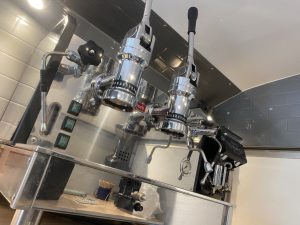There's a certain allure to taking your coffee business on the road. You imagine the freedom to choose your location, the open-air vibe, and the joy of bringing quality java to the people, no matter where they are. I too was enticed by this vision and after missing out on physical location (the owner turned it into flats) and took my coffee business mobile. While there are plenty of sunny days and satisfied customers, it's not without its challenges—challenges that differ significantly from a traditional brick-and-mortar setup. Here are some hard-won insights from my own experience that you might want to consider.

Murphy’s Law is Your Co-Pilot: More Things Go Wrong on the Road
Driving your café from location to location subjects your equipment to a level of abuse that it would never see in a static shop. From bumps in the road to constant packing and unpacking, the wear and tear is inevitable. Unfortunately, this means you may find yourself acting more like a mechanic than a barista at times. When catastrophe strikes while you’re serving an eager crowd, you'll understand the importance of having a toolset and some basic repair knowledge. Advice: Always carry a toolkit and spare parts. Know your machinery well enough to perform quick fixes that can get you through the day.Preparation is Not Just Key, It’s Your Lifeline
In a traditional café, if you run out of coffee cups or find your espresso machine acting up, you have a stockroom and perhaps even a nearby supplier. On the road, what you have in your van is *all* you have. Running out of essential supplies is not an option; it's a day-ender. Advice: Overpack, within reason. Carry backups for critical equipment and supplies. Make a comprehensive checklist and tick items off as you load them.The Quest for the Perfect Spot: Finding Events
Finding events that haven't already been claimed by other coffee stands is an exhausting rite of passage. It often involves relentless networking, relationship-building with event organizers, and a little bit of luck. Being on standby to fill in for another vendor at the last minute can sometimes be your foot in the door. Day trading is a tough ask and even though you can find yourself a serene location somewhere, regular visitors are harder to come by. Advice: Develop strong connections in the event circuit. Be flexible and willing to step in last-minute, but also discerning enough to recognize potentially unprofitable events.Beware the Money Pit: Some Events Will Make You Lose Cash
Even with the best planning, there will be events where you end up making a loss. From days of preparation to wasted product and unpredictable weather, the list of things that can go wrong is endless. Furthermore, nothing hits harder than when two big events are scheduled for the same day, and you have to choose. The opportunity cost of choosing one event over another is a daunting task, at which point refer to the lifetime earning potential of a particular event. Advice: Set aside a contingency fund to cushion the financial blows for a wasted day. Analyse each loss to learn what can be done differently next time.The Art of Packing Away: It's Not Just Wiping Counters
At the end of the day, packing up your mobile café isn't as simple as locking up a shop. It's a game of Tetris, fitting boxes and equipment into a confined space in such a way that they won't shift during transit. It's physically exhausting and mentally draining and it takes time and repetition to find efficiencies. Get strong, stackable boxes and make sure they fit in with your other bits. Advice: Optimise your packing routine. Maybe even practice it. Keep your storage containers modular and easy to handle.

